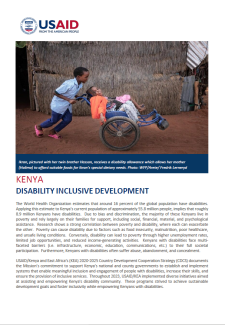The World Health Organization estimates that around 16 percent of the global population have disabilities. Applying this estimate to Kenya's current population of approximately 55.8 million people, implies that roughly 8.9 million Kenyans have disabilities. Due to bias and discrimination, the majority of these Kenyans live in poverty and rely largely on their families for support, including social, financial, material, and psychological assistance. Research shows a strong correlation between poverty and disability, where each can exacerbate the other. Poverty can cause disability due to factors such as food insecurity, malnutrition, poor healthcare, and unsafe living conditions. Conversely, disability can lead to poverty through higher unemployment rates, limited job opportunities, and reduced income-generating activities. Kenyans with disabilities face multi-faceted barriers (i.e. infrastructure, economic, education, communications, etc.) to their full societal participation. Furthermore, Kenyans with disabilities often suffer abuse, abandonment, and concealment.
Document

